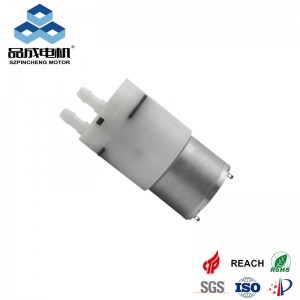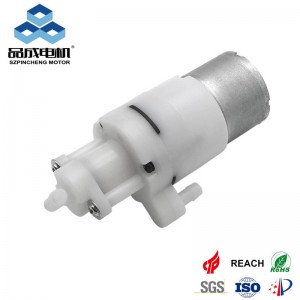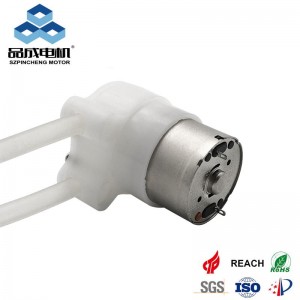As urban centers worldwide evolve into intelligent ecosystems, miniature diaphragm pump technology - including mini diaphragm water pumps, mini diaphragm air pumps, and mini diaphragm vacuum pumps - has emerged as an unsung hero in smart infrastructure. These compact, efficient devices are enabling revolutionary advancements across multiple urban systems through their precise fluid and air handling capabilities.
Water Management Applications
-
Smart Irrigation Systems
-
Mini diaphragm water pumps with IoT connectivity enable precision watering
-
Flow rates adjustable from 50-500ml/min based on soil moisture data
-
40% water savings compared to traditional sprinkler systems
-
Water Quality Monitoring Networks
-
Self-cleaning sensor stations using mini pumps
-
Continuous sampling for heavy metal detection
-
Low-power designs operating on solar energy
-
Leak Detection Systems
-
Networked pressure sensors with pump-assisted diagnostics
-
Early warning capabilities reducing water loss by up to 25%
Air Quality and Environmental Control
-
Urban Pollution Monitoring
-
Mini diaphragm air pumps enable 24/7 particulate sampling
-
Compact designs allow installation on streetlights and buildings
-
Real-time data integration with city air quality maps
-
HVAC Optimization
-
Precise refrigerant handling in smart buildings
-
Energy recovery systems using micro-pump technology
-
30% improvement in climate control efficiency
-
Waste Management
-
Vacuum-based trash collection systems
-
Odor control through activated air circulation
-
Reduced garbage truck emissions in city centers
Transportation Infrastructure
-
Electric Vehicle Support
-
Coolant circulation in charging stations
-
Battery thermal management systems
-
Lightweight designs ideal for mobile applications
-
Smart Traffic Systems
-
Pneumatic sensor cleaning mechanisms
-
Weather monitoring station integration
-
Self-maintaining roadway equipment
Emergency and Security Systems
-
Fire Detection/Suppression
-
Early smoke sampling networks
-
Compact foam proportioning systems
-
High-pressure micro-pump solutions
-
Flood Prevention
-
Distributed water level monitoring
-
Automated drainage pump activation
-
Predictive maintenance capabilities
Technical Advantages for Smart Cities
| Feature | Benefit | Smart City Impact |
|---|---|---|
| IoT Connectivity | Remote monitoring/control | Reduced maintenance costs |
| Energy Efficiency | Solar/battery operation | Sustainable infrastructure |
| Compact Size | High-density deployment | Comprehensive coverage |
| Quiet Operation | Urban noise reduction | Improved livability |
| Precision Control | Optimized resource use | Lower operational costs |
Emerging Innovations
-
Self-Powered Pumps
-
Kinetic energy harvesting from water flow
-
Thermoelectric generation from pipe gradients
-
Eliminating external power requirements
-
AI-Optimized Networks
-
Predictive maintenance algorithms
-
Dynamic flow adjustment learning systems
-
Failure pattern recognition
-
Nanomaterial Upgrades
-
Graphene-enhanced diaphragms
-
Self-cleaning hydrophobic surfaces
-
Embedded strain sensors
Implementation Case Studies
-
Singapore's Smart Water Grid
-
5,000+ mini diaphragm pumps deployed
-
98.5% uptime across the network
-
22% reduction in non-revenue water
-
London Air Quality Initiative
-
1,200 micro-pump monitoring stations
-
Hyperlocal pollution mapping
-
Informed traffic management policies
-
Tokyo's Underground Infrastructure
-
Vacuum-based utility tunnel monitoring
-
Condensation control systems
-
Space-efficient designs for tight installations
Future Development Pathways
-
5G-Enabled Pump Networks
-
Ultra-low latency control systems
-
Massive IoT device integration
-
Edge computing capabilities
-
Circular Water Systems
-
Greywater recycling applications
-
Rainwater harvesting optimization
-
Closed-loop industrial processes
-
Autonomous Maintenance
-
Self-diagnosing pump units
-
Drone-assisted servicing
-
Predictive parts replacement
As smart cities continue to evolve, mini diaphragm pump technology will play an increasingly vital role in creating sustainable, efficient, and responsive urban environments. The combination of precise fluid control, energy efficiency, and smart connectivity makes these components indispensable for next-generation infrastructure.
Smart city planners and engineers should consider miniature diaphragm pump solutions for:
-
Water conservation initiatives
-
Environmental monitoring networks
-
Energy-efficient building systems
-
Resilient emergency infrastructure
With continuous advancements in materials science, IoT integration, and renewable energy compatibility, these compact workhorses are poised to become even more critical in shaping the cities of tomorrow. Their ability to operate reliably in diverse conditions while providing precise control makes them ideal for the complex, interconnected systems that define smart urban ecosystems.
you like also all
Post time: Mar-25-2025




